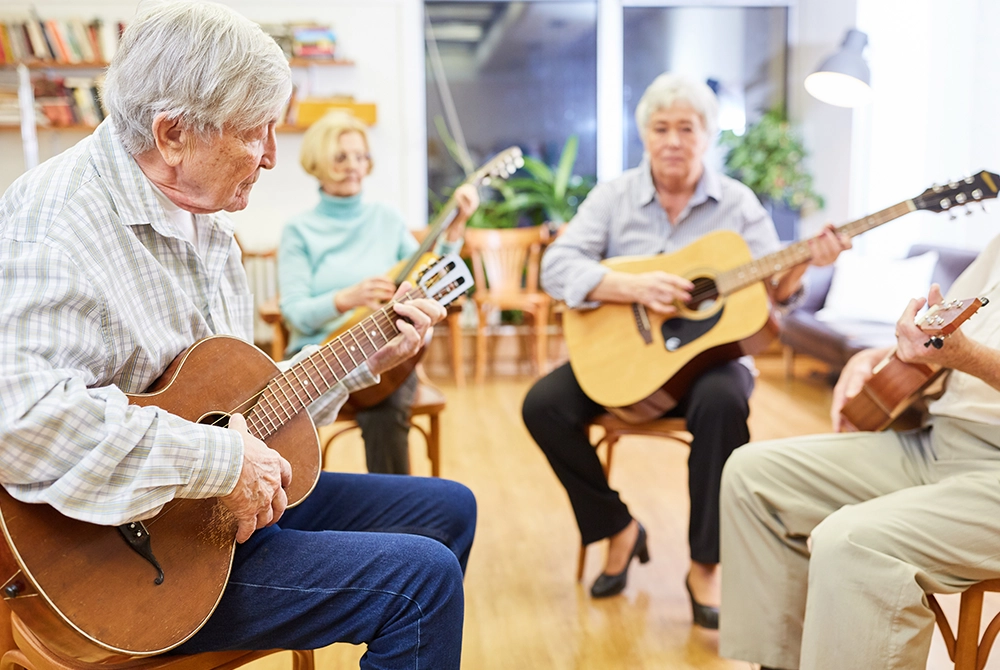Our Programs

What is Music Therapy?
Music is a common language for everyone. It evokes the feelings, thoughts, and emotions of all types. Whether it’s playing instruments, writing songs or relaxing to a melody – it finds a way to speak to each and every one of us. As a client-centred holistic approach to Addiction treatment, we utilize methods that promote creativity, self-expression, self-reflection, and self-understanding to better understand an individual Addiction journey and an individual’s recovery to sobriety.
At A.R.T, we use music therapy within weekly programming. Music therapy is an outlet to learn how music can be a tool within our recovery. We ask individuals: What does music mean to you? Does music trigger you? How can we work through mental health with music? What feelings do we get from music?

What is Music Therapy in Addiction Recovery?
Music Therapy is part of weekly programming that incorporates music, lyrics, instruments, singing, dancing, writing, playing, and learning. In addition, it can be utilized as a spiritual outlet during recovery.
How is Music Therapy Used at Addiction Rehab Toronto?
Recovery Music
We allow the opportunity for individuals to find their own inspiring recovery music by providing outlets such as Karaoke and YouTube for music introduction. We use recovery music as a way to do a lyric analysis and opening up on how these songs have impacted our own recovery and life.
Writing Songs
Journaling and writing is an important part of recovery. According to addiction research, writing songs provides individuals access to express oneself, stimulate attention, enhance skills of decision-making and goal setting (Leisuk, 2010). We give space and encouragement for musical and creative individuals to write their own songs about recovery. We use music therapy research to support individuals on the construction, the writing and the establishment of song lyric writing. We understand that everyone experiences sobriety and addiction differently, and journaling and writing is a great tool of channeling feelings, emotions, thoughts, patterns, and memories for an individual’s self-discovery. In addition, individuals are offered onsite instruments, in case of words, aren’t enough.
Karaoke
Addiction recovery can be fun. For some individuals expressing themselves means singing their hearts out to a favourite song. Music can be about socialization, self-acceptance and reminding oneself of being able to have fun even when sober.
Onsite Instruments
We have guitars, piano, drums, and other instruments to provide individuals with a more musical sense of self-expression. During self-reflection or onsite free time, we provide individuals the opportunity to pick up a guitar and strum some songs. We love the sound of the piano playing as it echoes through the hallways.
Mindfulness
We know that music is not just about stimulation, it can also be a time for calming the mind, body, and soul. We use music as a holistic and therapeutic background in our mindfulness approaches to Recovery. We utilize relaxing music as a way to quiet the mind during Reiki, Yoga, Art Therapy and Quiet Reflection.
Dance/Movement Therapy
William Purkey, once said, “you gotta dance like nobody’s watching.” Dancing and movement is a way to express, design, struggle, showcase and emancipate feelings and emotions by utilizing the body (Koch et Fischman, 2011.) It is a type of healing that allows individuals, through movement, to service their emotional, mental, physical and spiritual well-being. According to Movement Therapy research, it focuses on the “nonverbal expression, interaction, and communication” (Koch et Fischman, 2011). In addition, it’s a way for individuals to face their own self-image fears by losing themselves in the movement. As part of our Music Therapy programming, we allow individuals the opportunity to express themselves in movement by learning different types of dances and having a good time.
FYI
Within active addiction and alcohol abuse, our brain function is continuously being impaired. It can directly or indirectly target the brain’s reward system by flooding the circuit with dopamine. Dopamine is a neurotransmitter that regulates emotions, movement, motivation, and feelings of pleasure. Your brain is wired to ensure that we will repeat life-sustaining activities by associating those activities with pleasure or rewards. But the brain will react to the overwhelming surges of dopamine: by producing less dopamine or by reducing the number of received signals – this is why people feel “lifeless” or “depressed” and there is a need to reach that dopamine feeling again. It becomes a vicious cycle, the chemicals tap into the communication system and interfere with the way neurons normally send, receive and process information.
Music Therapy and Cognitive Rehabilitation
According to Addiction research, music therapy has a therapeutic impact on cognitive rehabilitation (Lesiuk, 2010.) As stated before, through active addiction, our brain and neurons become impaired. Music Therapy, of many tools we provide, are proven outlets to help rewire our brains.
Music can affect our brain: enhancing our senses (for example we can learn to hear better), enhance our rhythm (which can help our exercising because sometimes you need a rhythm), and enhance our empathy (because we find other ways to understand emotions, mostly through background music or lyrics.)
Music therapy is a proven supportive tool to influence neuroplasticity of the brain. It can help repair the parts of the brain that puts emphasis on cognitive abilities. Music therapy has been proven to improve memory, attention, decision-making, impulse control, listening, and planning. These factors are important when moving forward in relapse prevention.
Music Therapy and Emotions
Music Therapy allows individuals to evoke internal emotions – externally. Music makes us happy, excited, sad, angry, guilt, fun and motivated. As said before, it makes us feel things we might not have noticed before. We understand that expressing emotions is a sign of growth in addiction recovery. Music Therapy allows for these emotions to shine through.
Music Therapy is used for discussion on recovery lyrics, understand how to song write and re-teaching our body and mind on relaxation (Lesiuk, 2010). We ask individuals to find their own recovery songs and explain what the lyrics mean to them, we ask individuals to write songs of their experience during recovery or active addiction and we use relaxing music during moments of mindfulness, meditation, and quiet reflection. Doing these activities help individuals identify specific triggers within of addiction and recovery. Helping individuals work through these triggers which evoke conversations such as anger, self-esteem, self-acceptance, guilt, shame, loss, and happiness are necessary.
Music is the Language of the Heart
Music, emotions, and recovery have a long history – there are so many musicians that use music as an outlet of emotions such as Red Hot Chili Peppers, Eminem, Ray Charles, Keith Urban, and Amy Winehouse. And although we may have lost some great artists, we cherish their memory and their legacy through music.
Because as we use music, it can bring back good and bad memories. And as stated before, it’s a language that we can use to translate pain, grief, and loss through recovery. As we go through this journey together, we can use it as a tool of self-acceptance and self-preservation.
Music is the language of the heart. It is one of the many ways we provide individuals an outlet to express themselves, to understand themselves and to use as a tool to support themselves during their Addiction recovery to sobriety.











